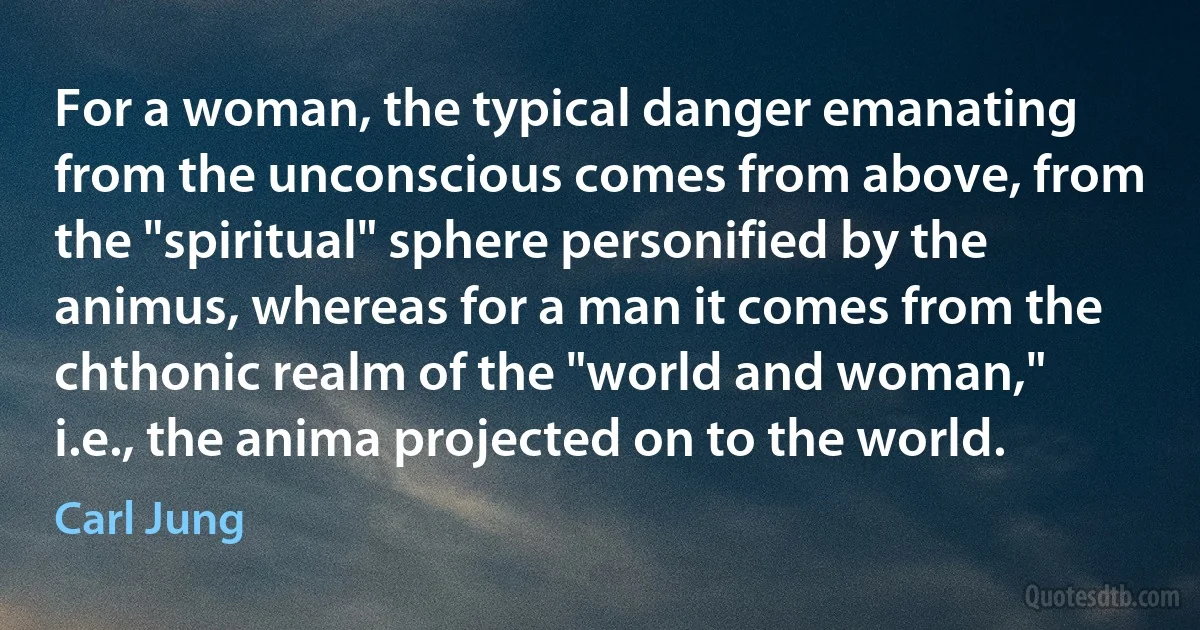Anima Quotes
Jung believed that alchemy is about the transmutation of of the mind and the discovery of the self. Inevitably, he saw the male and female elements of the prima materia -- the king and queen of alchemy -- as the animus and anima; this seemed to indicate the (sic) alchemy is about psychological processes.

Colin Wilson
The conscious side of woman corresponds to the emotional side of man, not to his "mind." Mind makes up the soul, or better, the "animus" of woman, and just as the anima of a man consists of inferior relatedness, full of affect, so the animus of woman consists of inferior judgments, or better, opinions.

Carl Jung
The way the anima initially manifests in an individual man usually bears the stamp of his mother's character. If he experienced her in a negative way, then his anima often takes the form of depressive moods, irritability, perpetual malcontent, and excessive sensitivity. If the man is able to overcome these, precisely these things can strengthen his manliness. Such a negative mother anima will endlessly whisper within a man: "I'm a nothing," "It doesn't make sense anyhow," "It's different for other people," "Nothing * gives me any pleasure," and so on. Continual fear of disease, impotence, or accidents are her work, and she constellates a general sense of gloom. Troubled moods like these can intensify to the point of temptations to suicide; thus the anima can become a demoness of death. She appears in this role in Cocteau's film Orpheus.

Marie-Louise von Franz
The "ultimate" questions referred to above do not always come up in the encounter with the shadow. Much more often behind him or her another inner figure emerges as a personification of the unconscious. This takes the form of a woman in a man, and in a woman, that of a man. Often it is they who are at work behind the shadow, throwing up new problems. C. G. Jung called them anima and animus. The anima embodies all feminine psychic qualities in a man-moods, feelings, intuitions, receptivity to the irrational, his personal capacity for love, his sense of nature, and most important of all, his relationship to the unconscious.

Marie-Louise von Franz
In real life, too, it takes a long time for a woman to bring the animus into consciousness, and it costs her a great deal of suffering. But if she succeeds in freeing herself from his possession, he changes into an "inner companion" of the highest value, who confers on her positive masculine qualities such as initiative, courage, objectivity, and intellectual clarity. Like the anima in a man, the animus also commonly exhibits four stages of development. In the first stage he manifests as a symbol of physical force, for example, a sports hero. In the next stage, in addition he possesses initiative and focused ability to act. In the third stage, he becomes "the word" and is therefore frequently projected onto noteworthy intellectuals, like doctors, ministers, and professors.

Marie-Louise von Franz
As the anima does with men, the animus also creates states of possession in women. In myths and fairy tales this condition is often represented by the devil or an "old man of the mountain," that is, a troll or ogre, holding the heroine prisoner and forcing her to kill all men who approach her or to deliver them into the hands of the demon; or else the father shuts up the heroine in a tower or a grave or sets her on a glass mountain, so that no one can get near her. In such cases, the heroine can often do nothing but wait patiently for a savior to deliver her from her plight. Through her suffering, the animus (for both the demon and the savior are two aspects of the same inner power) can be gradually transformed into a positive inner force.

Marie-Louise von Franz
The Cataphrygians brought in also several other superstitions: such as were the doctrine of Ghosts, and of their punishment in Purgatory, with prayers and oblations for mitigating that punishment, as Tertullian teaches in his books De Anima and De Monogamia. They used also the sign of the cross as a charm.

Isaac Newton
The French call such an anima figure a femme fatale. The sirens of the Greeks and the Lorelei of the Germans embody these dangerous aspects of the anima-in a word, destructive illusions. The following Siberian tale gives a particularly apt portrayal of such a destructive anima:.

Marie-Louise von Franz
When a person has inwardly struggled with his anima or with her animus for a sufficiently long time and has reached the point where he or she is no longer identified with it in an unconscious fashion, the unconscious once again takes on a new symbolic form in relating with the ego. It then appears in the form of the psychic core, that is, the Self. In the dreams of a woman, the Self, when it personifies itself, manifests as a superior female figure, for example, as a priestess, a sorceress, an earth mother, or a nature or love goddess. In the dreams of a man, it takes the form of some-one who confers initiations (an Indian guru), a wise old man, a nature spirit, a hero, and so forth. An Austrian fairy tale recounts the following:.

Marie-Louise von Franz


